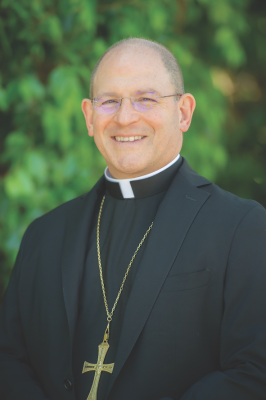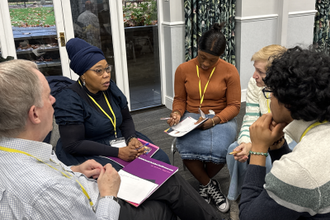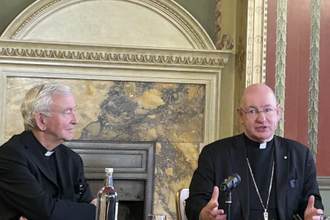Women's ordination a 'niche issue'?

Bishop Anthony Randazzo. Image: Diocese of Broken Bay
Professor Dr John Wijngaards writes: During these opening days of the latest Roman session of the synod, Bishop Anthony Randazzo of Broken Bay, Australia, has given a press conference. He denounced what he said is an overly western agenda obsessed with 'niche issues' such as women's ordination. In his view it diverts attention from more pressing topics.
Bishop Randazzo, who is president of the Federation of Catholic Bishops' Conferences of Oceania, called it "a new form of colonialism . . . not the mind of the synodal Church in mission". Pointing his finger at western countries he declared: "Topics must not be so all-consuming that others cannot live or exist on the face of this planet simply because you, people of might and power and authority and wealth, decide that those niche issues are the most important ones . . . Do not forget the most vulnerable, and remember, when you come to Oceania, you here in Europe are the periphery."
It would be easy to simply ignore the Bishop's statement as a serious misjudgement of the situation, which it obviously is. Unfortunately, his view may reflect the minds of many male participants and it will strengthen the hand of conservative powers in the Vatican. So, it requires a clear and strong response.
The Bishop underestimates the urgency on women's ordination on multiple points. Let us explore some of them.
Ordained men deciding the fate of women
The official Church has reduced women to second-class members throughout most of its entire history. Bishop Randazzo fits the mould.
The Fathers of the Church adopted prejudices of the Greek-speaking world. St Augustine says: "It is the natural order among people that women serve their husbands, because the justice of this lies in (the principle that) the lesser serves the greater . . . This is the natural justice that the weaker brain serves the stronger" (Heptateuch, Bk I, 153).
St Thomas Aquinas is a spokesman for the Middle Ages. Among many damaging statements about women we find a denigration such as this: "Woman is naturally of less strength and dignity than man . . . Good order would be wanting in the human family if some were not governed by others wiser than themselves. By such a kind of subjection woman is naturally subject to man, because in man the discretion of reason predominates" (Summa Theologica I, qu. 92, art. 1, ad 2).
And now Bishop Randazzo, a man, wants to decide an issue involving women. He might easily win, because of the 363 synodal participants with a right to vote only 54 are women - and that by a special papal concession. Men outnumber 4 to 1. And why is this so? Why are the majority of participants men? Simply because by rejecting women's ordination, hierarchies do not have female bishops.
The Church's complicity in the oppression of women
In my new book, Why Christ rejects all Church prejudice against women, scholars from all continents, including Africa, Asia and Latin America, report on the inequal status of women. And the local Catholic bishops and priests contribute to that oppression. Read, for instance, this account by Prof Sr Marilú Rojas Salazar:
"In Mexico, 11 women are murdered daily and there has been an anti-feminicide struggle since 1993. Relatives of victims, feminists, human rights organizations and academics in the town Juárez denounced and demanded justice for the disappearance, sexual torture, rape, murder and abandonment of the victims' bodies as waste in vacant lots, garbage dumps and in desert areas of the city.
In life, they had been girls and young people, mostly with an average age of 17 years. Their bodies as workers, dark-skinned and poor, buried or half-buried, devoid of all dignity, showed the organized and dehumanizing systematicity of patriarchal violence. It exposed the absence of justice for them and their families. These events did not give rise to a robust and strong denunciation by the hierarchy of the Mexican Catholic Church, despite the atrocity of the events. It is only very recently that the hierarchy have published a lukewarm response, calling for reflection on the events."
Prof Salazar describes the many useful services rendered to the Church by women. "However, all these activities are always under the authority of the clergy", she says. "And many times not only under their authority, but under their taste, manner, and character. In most cases, clerics exercise a hegemonic patriarchal machocratic mode of 'authority' over the women who 'provide' these services. And since they are 'services', the women do not receive any financial remuneration. The work of women in the Catholic Church is unpaid for, and often exploited. In addition, women are not given recognition for their ministries, since those who take credit for this work are the priests."
Scholars from Colombia, Nigeria, East Africa, India and the Philippines provide similar reports. Disgracefully, it is the Catholic Church acting as a colonial power, rather than the West.
Inequality of women in Oceania worse than anywhere else
And what makes Bishop Randazzo, president of the Federation of Catholic Bishops' Conferences of Oceania, bold enough to call women's ordination a 'niche issue'? Does he not know that Oceana ranks as worst in the world regarding women's inequality. The UN Women's Fact-sheet-Oceania 2018, provides details:
- Oceania (excluding Australia and New Zealand) is the region with the highest 12-month prevalence of intimate partner violence, with up to 40% of women aged 15-49 reporting having experienced partner violence (based on data from 6 countries, 11% population coverage).
- In 2015, Oceania reported 188 maternal deaths for every 100,000 live births, a higher ratio than all other regions except sub-Saharan Africa
- In Oceania, women aged 25-34 are over-represented among the poor: there are 113 women for every 100 men living on less than $1.90 a day. The gender gap is larger for women and men aged 55-59: For this population, there are 119 women living in poverty for every 100 men.
- Oceania has the lowest proportion of women in national parliaments in the world - on average across the region, women hold just 5.4% of parliamentary seats.
Oceania includes a wide range of countries: Australia, Papua New Guinea, New Zealand, Fiji, the Solomon Islands, Federated States of Micronesia, Vanuatu, Samoa, Kiribati, Tonga, the Marshall Islands, Palau, Tuvalu, and Nauru. Male Catholic hierarchies govern the Church in all these countries.
Ordaining women as deacons, priests, bishops, would greatly boost the spiritual and moral support given to women in their quest for true equality and justice. The Second Vatican Council prescribes: "With respect to the fundamental rights of the person, every type of discrimination, whether social or cultural, whether based on sex, race, colour, social condition, language or religion, is to be overcome and eradicated as contrary to God's intent" (Gaudium et Spes, 29b).
Prof Dr John Wijngaards
Chairman Wijngaards Institute for Catholic Research


















